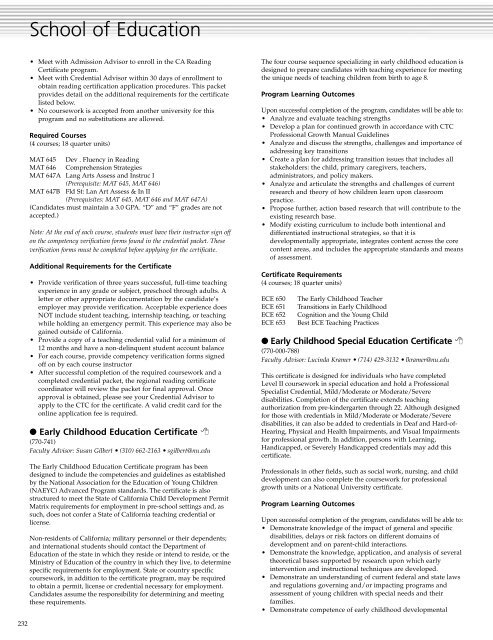Catalog 73 - National University
Catalog 73 - National University
Catalog 73 - National University
- No tags were found...
Create successful ePaper yourself
Turn your PDF publications into a flip-book with our unique Google optimized e-Paper software.
School of Education• Meet with Admission Advisor to enroll in the CA ReadingCertificate program.• Meet with Credential Advisor within 30 days of enrollment toobtain reading certification application procedures. This packetprovides detail on the additional requirements for the certificatelisted below.• No coursework is accepted from another university for thisprogram and no substitutions are allowed.Required Courses(4 courses; 18 quarter units)MAT 645 Dev . Fluency in ReadingMAT 646 Comprehension StrategiesMAT 647A Lang Arts Assess and Instruc I(Prerequisite: MAT 645, MAT 646)MAT 647B Fld St: Lan Art Assess & In II(Prerequisites: MAT 645, MAT 646 and MAT 647A)(Candidates must maintain a 3.0 GPA. “D” and “F” grades are notaccepted.)Note: At the end of each course, students must have their instructor sign offon the competency verification forms found in the credential packet. Theseverification forms must be completed before applying for the certificate.Additional Requirements for the Certificate• Provide verification of three years successful, full-time teachingexperience in any grade or subject, preschool through adults. Aletter or other appropriate documentation by the candidate’semployer may provide verification. Acceptable experience doesNOT include student teaching, internship teaching, or teachingwhile holding an emergency permit. This experience may also begained outside of California.• Provide a copy of a teaching credential valid for a minimum of12 months and have a non-delinquent student account balance• For each course, provide competency verification forms signedoff on by each course instructor• After successful completion of the required coursework and acompleted credential packet, the regional reading certificatecoordinator will review the packet for final approval. Onceapproval is obtained, please see your Credential Advisor toapply to the CTC for the certificate. A valid credit card for theonline application fee is required.● Early Childhood Education Certificate 8(770-741)Faculty Advisor: Susan Gilbert • (310) 662-2163 • sgilbert@nu.eduThe Early Childhood Education Certificate program has beendesigned to include the competencies and guidelines as establishedby the <strong>National</strong> Association for the Education of Young Children(NAEYC) Advanced Program standards. The certificate is alsostructured to meet the State of California Child Development PermitMatrix requirements for employment in pre-school settings and, assuch, does not confer a State of California teaching credential orlicense.Non-residents of California; military personnel or their dependents;and international students should contact the Department ofEducation of the state in which they reside or intend to reside, or theMinistry of Education of the country in which they live, to determinespecific requirements for employment. State or country specificcoursework, in addition to the certificate program, may be requiredto obtain a permit, license or credential necessary for employment.Candidates assume the responsibility for determining and meetingthese requirements.The four course sequence specializing in early childhood education isdesigned to prepare candidates with teaching experience for meetingthe unique needs of teaching children from birth to age 8.Program Learning OutcomesUpon successful completion of the program, candidates will be able to:• Analyze and evaluate teaching strengths• Develop a plan for continued growth in accordance with CTCProfessional Growth Manual Guidelines• Analyze and discuss the strengths, challenges and importance ofaddressing key transitions• Create a plan for addressing transition issues that includes allstakeholders: the child, primary caregivers, teachers,administrators, and policy makers.• Analyze and articulate the strengths and challenges of currentresearch and theory of how children learn upon classroompractice.• Propose further, action based research that will contribute to theexisting research base.• Modify existing curriculum to include both intentional anddifferentiated instructional strategies, so that it isdevelopmentally appropriate, integrates content across the corecontent areas, and includes the appropriate standards and meansof assessment.Certificate Requirements(4 courses; 18 quarter units)ECE 650ECE 651ECE 652ECE 653The Early Childhood TeacherTransitions in Early ChildhoodCognition and the Young ChildBest ECE Teaching Practices● Early Childhood Special Education Certificate 8(770-000-788)Faculty Advisor: Lucinda Kramer • (714) 429-3132 • lkramer@nu.eduThis certificate is designed for individuals who have completedLevel II coursework in special education and hold a ProfessionalSpecialist Credential, Mild/Moderate or Moderate/Severedisabilities. Completion of the certificate extends teachingauthorization from pre-kindergarten through 22. Although designedfor those with credentials in Mild/Moderate or Moderate/Severedisabilities, it can also be added to credentials in Deaf and Hard-of-Hearing, Physical and Health Impairments, and Visual Impairmentsfor professional growth. In addition, persons with Learning,Handicapped, or Severely Handicapped credentials may add thiscertificate.Professionals in other fields, such as social work, nursing, and childdevelopment can also complete the coursework for professionalgrowth units or a <strong>National</strong> <strong>University</strong> certificate.Program Learning OutcomesUpon successful completion of the program, candidates will be able to:• Demonstrate knowledge of the impact of general and specificdisabilities, delays or risk factors on different domains ofdevelopment and on parent-child interactions.• Demonstrate the knowledge, application, and analysis of severaltheoretical bases supported by research upon which earlyintervention and instructional techniques are developed.• Demonstrate an understanding of current federal and state lawsand regulations governing and/or impacting programs andassessment of young children with special needs and theirfamilies.• Demonstrate competence of early childhood developmental232
















